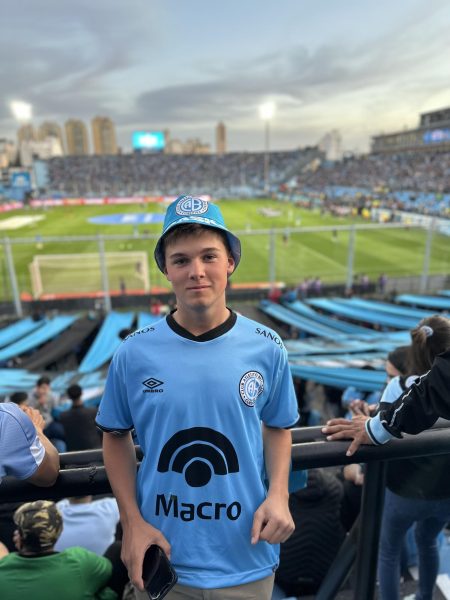An Interview with Larry Bell
Coach and teacher Larry Bell recently received the Frank A. Zoltek Award for Passionate Coaching. The Echo met up with Bell to hear his thoughts about the award and his background as a coach.
Echo: Can you tell me a bit more about the award?
Bell: Well, my understanding is it’s an award named for a coach—I think he was at Drury (what’s his last name?) Frankie? Frank Zoltek I think—and his friends and teammates. When he passed, they wanted to do something to honor him. He’s a long time coach, multiple seasons, that sort of thing. So they kinda look around North Berkshire for coaches who have put in a lot of time in all levels of youth sports, high school or community. So it’s sort of a local honor for people who value the importance of sports for kids.
E: Were you expecting it?
B: No I had forgotten all about those kinda things. I mean, I’m a year removed now from coaching and last year I had received some local honors and kinda thought I’m ancient history now. I’d forgotten so when I got a call from him I actually thought it was somebody else calling with a similar last name who’s involved in a lot of cross country skiing, so I’m thinking he’s calling me to go skiing.
E: What sports have you coached?
B: Well here I actually started coaching a co-ed middle school soccer team because the cross country coach didn’t need any help and they were already doing really well so I just wanted to keep coaching. But mostly I’ve coached cross country running, track, and I helped with cross country skiing for a few years until my daughter had seen enough of me so I stopped.
E: How important to you is coaching kids?
B: Well I just look at coaching as an extension of teaching. Probably it’s in many ways more impactful than the classroom for an educator. Because you can kinda get so zeroed in on preparing for tests and standardized tests and that sort of thing, that you don’t fine tune things as much for what a particular student needs, or you don’t get to know them as well. So I’ve always look at it as another way of teaching where the kids are more motivated, they want to be there and you get big blocks of time with them and you get the same kid year after year and you really get to know them well so I’ve always looked at coaching as a more ideal form of an educational situation.
E: Would you say you like coaching more than teaching?
B: Coaching was more fun because you’re able to just kinda free yourself from the curriculum when you need to…you can kinda adapt it to a certain group of kids or individual, where in a classroom it’s really hard to tell help a kid in a specific area.
E: How do you feel about how sports are run here?
B: Oh good question, I think sports are a great balance to the classroom because of the academic stress kids feel here so it gives them a release. I don’t know that we run it much differently than other schools, but what’s good about Greylock is it’s a balanced community with the sports balancing the academics so you get well-rounded kids and it teaches perseverance, which I think schools struggle with. Schools have a really hard time letting someone experience failure cause it’s “their permanent record, it’s their transcript, they might not get into the perfect school or whatever.” So there is this fear for everybody of letting kids have a consequence within the school day, but in sports you can’t avoid a consequence. You’re gonna get beat… you screw up. It’s gonna show up if you don’t train, people are gonna see it. Especially in a sport like I coached, it’s not a bad pass, you’re slower, so the sports that I coached had an individual consequence which I really liked because I think that’s an important skill that school sometimes has trouble teaching.
E: How do you feel about kids feeling pressured to do well at both school and at sports?
Well, I guess my feeling about that takes me back to where I started coaching in a little country school in the midwest. They required for every teacher to do a club or teach a sport because they had about twenty kids in a grade, so we needed all teachers to run activities, and we needed every kid involved to field teams. I think that gave a more balanced perspective on what kids go through to the faculty because the faculty couldn’t start their grading ‘till after dinner either. So you had less competition for kids’ time and I think here there is not enough hours in the day for a student to succeed everywhere, leading to shortcuts where they sacrifice their integrity for performance in the classroom and a sports field. So I think that’s a fault that we don’t have enough faculty living the day of a student, so they don’t understand time commitment…So it’s a little unreasonable trying to get the kids to a high level, that can beat up the kids a little bit.
E: Do you miss coaching?
Honestly no, so that’s how I knew it was definitely time for me to go. I mean, I joke about it. I miss the relationships and connection with students, but having time to try to train again myself—because I had a knee injury 15 years ago so I couldn’t run with the team and that changed the way I coached dramatically and coaching wasn’t as enjoyable when I couldn’t go on long runs and have that personal connection with kids. I think if I was able to run right up until the last several years I’d miss coaching more, but I’m focussing on my own fitness now. It’s kinda neat every day to put my time into my family and taking care of my grandkids a couple days a week. I think that suffered because my wife took the brunt of being there for all these kids…and now I’m trying to help around a bit more with my family and my mom needs more care and things like that so I’m happy to be back.





